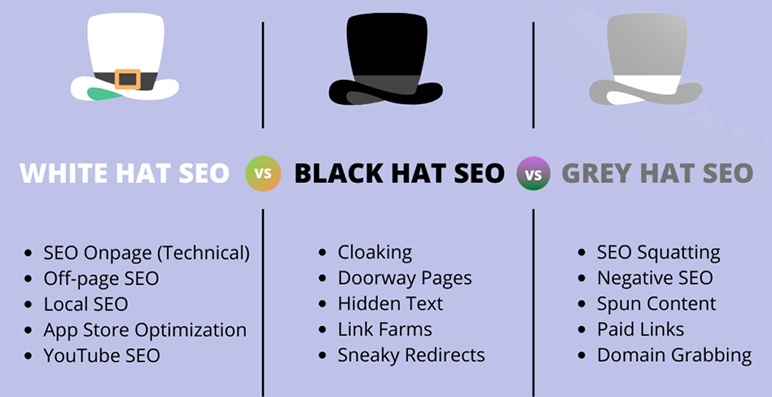
Behind the Veil: Unveiling the Truth About Black Hat SEO
In the fast-paced world of digital marketing, businesses are always in pursuit of strategies that can catapult their websites to the top of search engine rankings. Amidst the myriad of legitimate, “White Hat” SEO techniques, lurks the shadowy realm of “Black Hat” SEO, luring the uninitiated with promises of quick, high-ranking results.
Black Hat SEO, named so for its association with the ‘bad guys’ in old western movies, employs manipulative tactics that violate search engine guidelines for the sole purpose of improving a site’s search rankings. These practices include keyword stuffing, cloaking, link schemes, and hidden text, among others. While these techniques may seem alluring due to their potential for quick gains, it’s crucial to understand their implications fully. So, is Black Hat SEO worth the risk? This article sheds light on the reality of Black Hat SEO, exploring its risks, consequences, and the importance of ethical SEO practices.
Understanding Black Hat SEO Techniques
Black Hat SEO encompasses a broad array of practices designed to trick search engines. For instance, “keyword stuffing” involves overloading a webpage’s content with specific keywords in an unnatural way, hoping to manipulate search rankings.
“Link schemes,” another Black Hat tactic, involve creating networks of websites that link to each other, aiming to influence the popularity factor used by search algorithms. “Cloaking” is another deceptive method where the content presented to the search engine spider differs from that presented to the user’s browser.
The Risks and Consequences of Black Hat SEO
While the appeal of fast, effortless results is undeniable, Black Hat SEO poses severe risks. Search engines, such as Google, are perpetually enhancing their algorithms to detect and penalize Black Hat tactics. Websites found guilty of these practices can suffer harsh penalties, including significant drops in search rankings or even total removal from search results.
Moreover, these practices can severely tarnish your brand’s reputation. Users tricked into visiting your website through manipulative tactics will likely have a negative experience, leading to poor user satisfaction, reduced trust, and potential damage to your online reputation.

The Power of White Hat SEO
In contrast, White Hat SEO encompasses practices that align with search engine guidelines, focusing on providing value to users. Keyword research, quality content creation, and user-friendly site navigation are among the White Hat strategies that, while requiring more effort, provide long-term, sustainable benefits.
Moreover, White Hat SEO nurtures a positive user experience, enhancing trust and customer loyalty, which can ultimately lead to better conversion rates and long-term success. Besides, adherence to ethical SEO practices safeguards your site against search engine penalties and helps maintain a strong, trustworthy online reputation.
Is Black Hat SEO Worth It?
While the allure of quick, high-ranking results may make Black Hat SEO seem tempting, the potential risks and penalties make it a hazardous gamble. The short-term gains that these practices promise are far outweighed by the potential long-term damage to your website’s search rankings and reputation.
Instead, a focus on White Hat SEO techniques, providing genuine value to your users, is the path to sustainable success in the digital realm. Remember, when it comes to SEO, there are no shortcuts to genuine, long-lasting success.
The key to successful SEO is not in the manipulation of algorithms, but in the understanding of your audience’s needs and interests, and delivering valuable, relevant content accordingly.
Similar news
-
 Brand Strategy in Times of Change: Building Lon...
Brand Strategy in Times of Change: Building Lon...Organisations entering 2025 face markets shaped by rapid technological shifts, …
-
 Grey Marketing 2.0: How Grey and Black-Hat SEO ...
Grey Marketing 2.0: How Grey and Black-Hat SEO ...As artificial intelligence and machine learning dominate digital marketing, traditional …
-
 Emotional Manipulation in Advertising: How Cris...
Emotional Manipulation in Advertising: How Cris...In times of global instability, emotions become powerful tools for …
